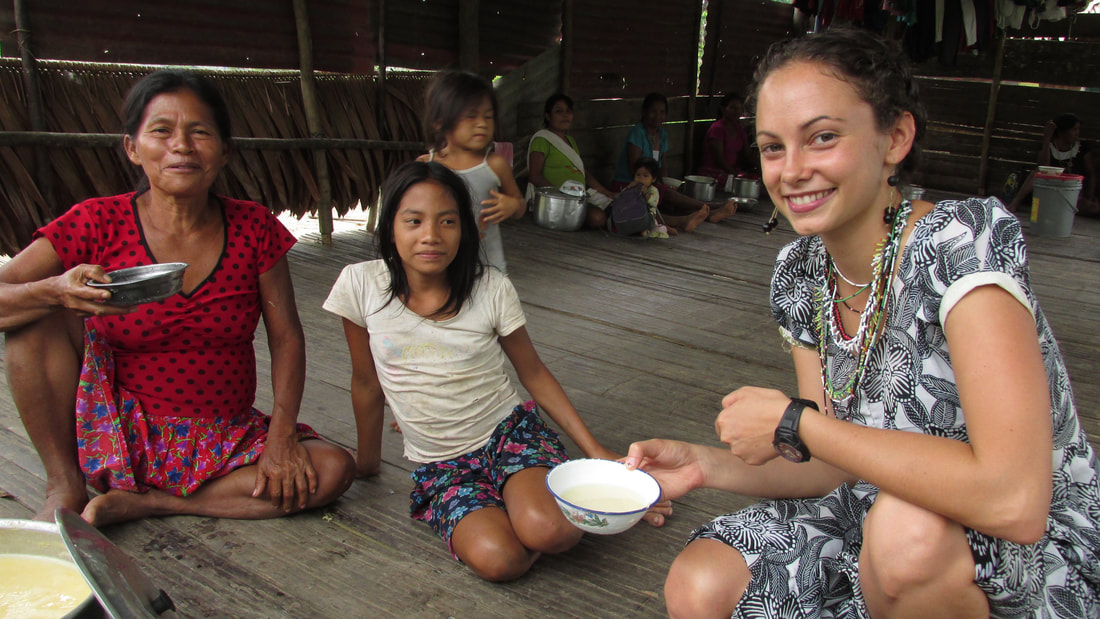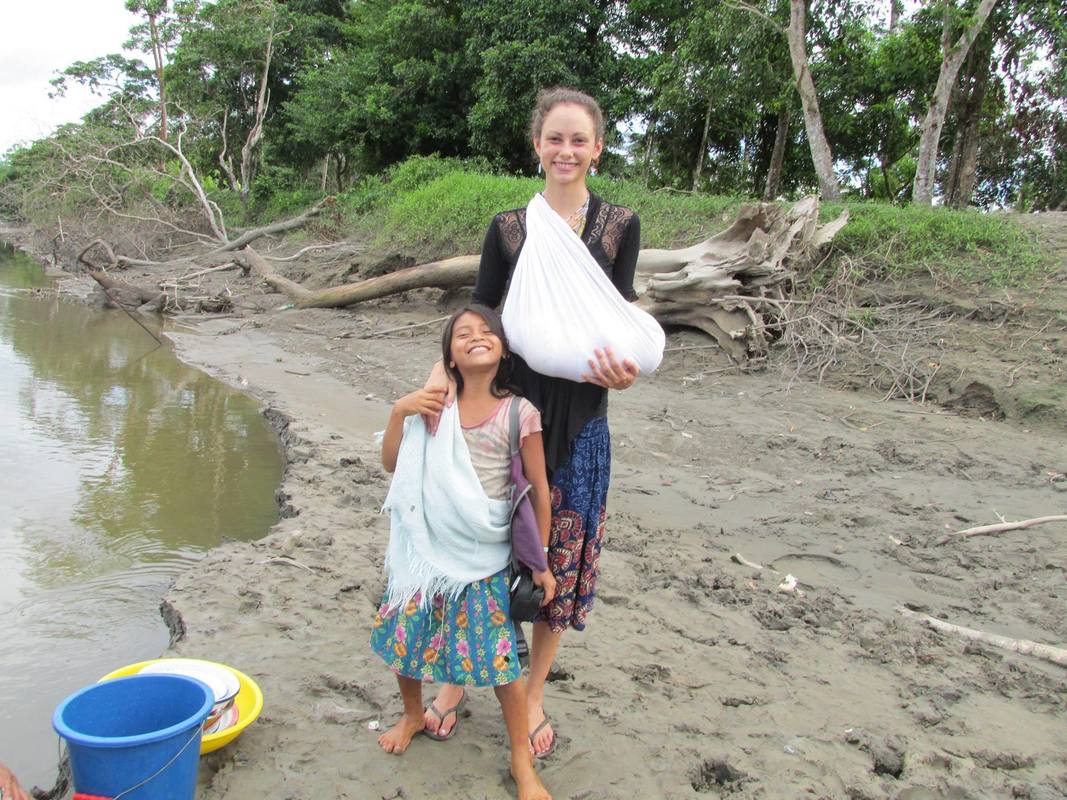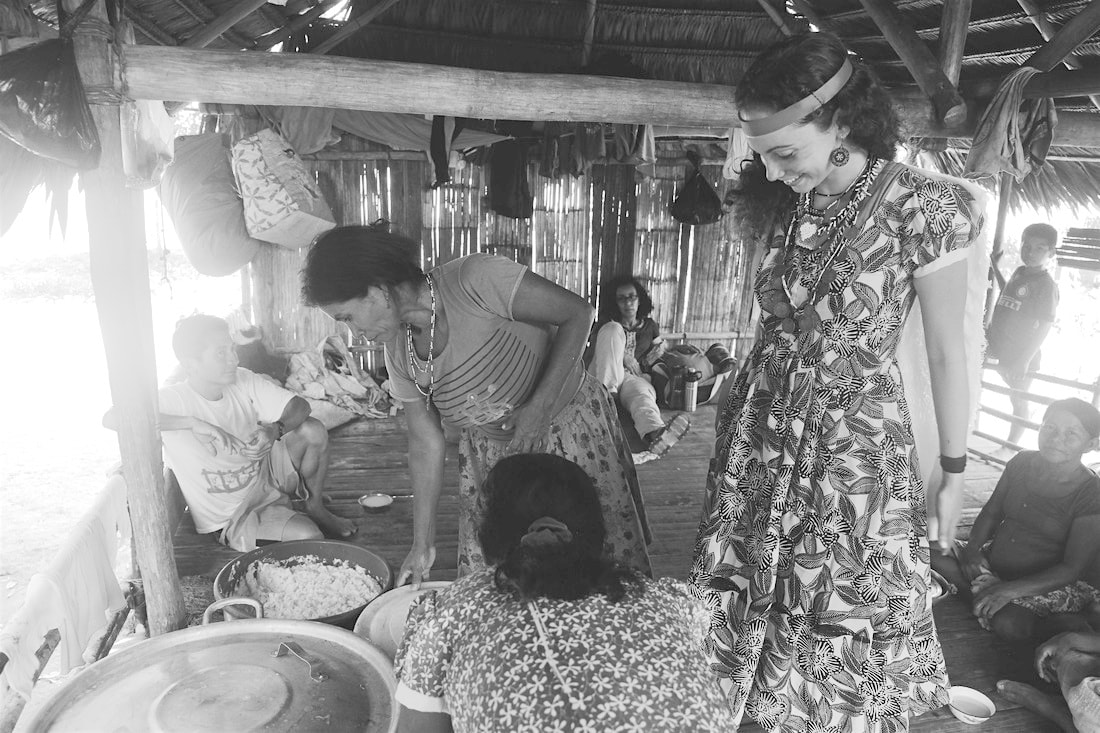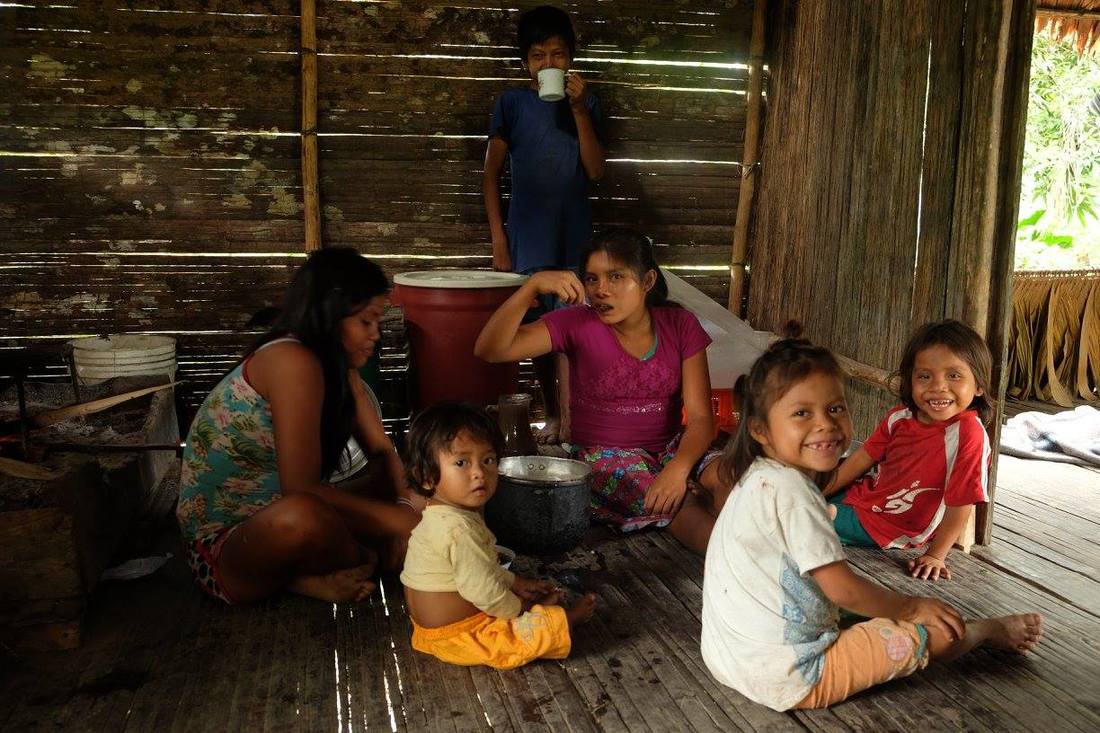Those of you who have followed my time on the river from the very beginning have heard me mention the name, Selmira, on a regular basis. She was the first believer from her people group. The Lord was already calling her to Himself through vivid dreams even before the Wycliffe arrived in the early 2000's. She has worked with Wycliffe since the beginning of the Bible translation process as a translator. Her faith and story are incredible.
I met her and her family my very first trip to her village in 2013. During my single years (2013-2016) on the river, Selmira and her family took special care of me and the other single ladies I partnered with. Over the three+ years of knowing them and working in the area, Selmira and her family ended up feeling like my Napuruna family in a lot of ways. Finally in 2016 they became my "blood-family" when Selmira officially became my godmother in our Napuruna marriage ceremony. She and our godfather, Romolo, also took on the roles of my parents and "gave me away" at my Napuruna wedding (i.e. not in a western sense of the expression, but in the Napuruna cultural equivalent of the idea ;). So in addition to being like my adopted Napuruna mother, Selmira and her family "officially" became (in the Napuruna world & family structure) Nem & my family October 16, 2016.
You might have found yourself shaking your head at the frequency of family-related terms that are in this blog post, so let me back up and explain some of the basics of how the Napuruna family structure & terminology works. Among the Napurunas, family is everything. That's not an over-statement in any way. In village life, everyone calls almost everyone "brother," Wawki or Turi, & "sister," Ñaña or Pani. Now, which terms you use depends on if you are male or female. If you are a female you use the terms Turi & Ñaña, but if you are male you use Wawki & Pani. Now, as a rule, Napuruna's refer to one another with these "bother/sister" terms, so this means you would call your real, blood siblings "brother" or "sister" aaaaaand almost everybody else that is Napurunan including those you aren't actually related to at all by blood and even those you are meeting for the first time.
One of the few exceptions to the Wawki"/"Ñaña rule is in the case of outsiders, none-Napuruna's, &/or strangers. People who fall into this category are generally referred to in Spanish terms such as "amigos," "gringos," "hermano/a"...etc. They normally are not referred to as Wawki or Ñaña, especially not by the Napuruna family group as a whole. My first couple of years on the river, I noticed this almost right away. I was referred to as "gringa" or "hermana" most frequently. While I worked hard to be seen as a member of the family, it wasn't until after I had an official Napuruna family tie through having Napuruna godparents that everyone (even Napuruna's that I didn't know) started calling me Ñaña o Pani. That was so cool when I recognized the switch! I had learned in my masters courses on culture how tribal families like the Napuruna often use an "us/family and them/outsiders" way of looking at the world, so I knew from the very start that I didn't want to be left in the "outsiders" category. It just took me a while within the Napuruna family system to finally and "legally" to be included in the "us" category.
I met her and her family my very first trip to her village in 2013. During my single years (2013-2016) on the river, Selmira and her family took special care of me and the other single ladies I partnered with. Over the three+ years of knowing them and working in the area, Selmira and her family ended up feeling like my Napuruna family in a lot of ways. Finally in 2016 they became my "blood-family" when Selmira officially became my godmother in our Napuruna marriage ceremony. She and our godfather, Romolo, also took on the roles of my parents and "gave me away" at my Napuruna wedding (i.e. not in a western sense of the expression, but in the Napuruna cultural equivalent of the idea ;). So in addition to being like my adopted Napuruna mother, Selmira and her family "officially" became (in the Napuruna world & family structure) Nem & my family October 16, 2016.
You might have found yourself shaking your head at the frequency of family-related terms that are in this blog post, so let me back up and explain some of the basics of how the Napuruna family structure & terminology works. Among the Napurunas, family is everything. That's not an over-statement in any way. In village life, everyone calls almost everyone "brother," Wawki or Turi, & "sister," Ñaña or Pani. Now, which terms you use depends on if you are male or female. If you are a female you use the terms Turi & Ñaña, but if you are male you use Wawki & Pani. Now, as a rule, Napuruna's refer to one another with these "bother/sister" terms, so this means you would call your real, blood siblings "brother" or "sister" aaaaaand almost everybody else that is Napurunan including those you aren't actually related to at all by blood and even those you are meeting for the first time.
One of the few exceptions to the Wawki"/"Ñaña rule is in the case of outsiders, none-Napuruna's, &/or strangers. People who fall into this category are generally referred to in Spanish terms such as "amigos," "gringos," "hermano/a"...etc. They normally are not referred to as Wawki or Ñaña, especially not by the Napuruna family group as a whole. My first couple of years on the river, I noticed this almost right away. I was referred to as "gringa" or "hermana" most frequently. While I worked hard to be seen as a member of the family, it wasn't until after I had an official Napuruna family tie through having Napuruna godparents that everyone (even Napuruna's that I didn't know) started calling me Ñaña o Pani. That was so cool when I recognized the switch! I had learned in my masters courses on culture how tribal families like the Napuruna often use an "us/family and them/outsiders" way of looking at the world, so I knew from the very start that I didn't want to be left in the "outsiders" category. It just took me a while within the Napuruna family system to finally and "legally" to be included in the "us" category.
Ok, so remember how I gave you two categories earlier from the Napuruna community structure: outsiders and "brothers/sisters" (i.e. Wawki/Ñaña). Now I'm going to give you two more categories that might be a little more complicated to understand, but fall into a Napuruna concept called allyuchina, which when translated is "to make family." You "make family" in the culture when you bring into your family a new member(s) through choosing godparents or co-parents or a godchild. These moments of "making family" are marked by special ceremonies that announce the new family connection. There are also ongoing ceremonies that follow after the inicial initiation of the relationship to bring attention to the importance of this special relationships. Remember how I said that Selmira & Romolo became our godparents at marriage? So the moment that relationship was official, we could no longer call them "brother/sister" in Kichwa. They are our "Madrina/Padrino" (Godparents in Spanish), which is Markamama/Markayaya in Kichwa, and we became to them their Markaushushi/Markachuri (aka their goddaughter & godson).
I was surprised to find in my experience that this family-tie often feels even more personal and special than just being someone's Napuruna "sister/brother." Think about it: the Brother/Sister terms in the western-world seem to designate a close relationship, but on the river, the majority of relationships are described using the Wawki/Ñaña terms, so it's a more general term. But in the case of godparents, each person has a special, personal relationship with their godparents that is marked by special terms and cultural customs and ceremonies reserved only for that relationship. The ongoing ceremonies & social responsibilities that follow the formation of a new family tie span the lifetime of the people involved.
Connected with the category of godparents, there's a 2nd category that is what I would roughly translate in English as Co-parents (i.e. "Conpadres" in Spanish). "Conpadres" in the Napuruna system marks a 2nd special tie or relationship between the parents and the godparents of a child. So to put it in a more practical, personal way: at our Napuruna wedding, Nem & I had to decide who would be the godparents of our first child (in case you're wondering if you missed something, no, we don't have any kids yet, but this is something everyone figures out on their Napuruna wedding day. You know, thinking ahead! ;). So we have Napuruna godparents and conpadres.
I was surprised to find in my experience that this family-tie often feels even more personal and special than just being someone's Napuruna "sister/brother." Think about it: the Brother/Sister terms in the western-world seem to designate a close relationship, but on the river, the majority of relationships are described using the Wawki/Ñaña terms, so it's a more general term. But in the case of godparents, each person has a special, personal relationship with their godparents that is marked by special terms and cultural customs and ceremonies reserved only for that relationship. The ongoing ceremonies & social responsibilities that follow the formation of a new family tie span the lifetime of the people involved.
Connected with the category of godparents, there's a 2nd category that is what I would roughly translate in English as Co-parents (i.e. "Conpadres" in Spanish). "Conpadres" in the Napuruna system marks a 2nd special tie or relationship between the parents and the godparents of a child. So to put it in a more practical, personal way: at our Napuruna wedding, Nem & I had to decide who would be the godparents of our first child (in case you're wondering if you missed something, no, we don't have any kids yet, but this is something everyone figures out on their Napuruna wedding day. You know, thinking ahead! ;). So we have Napuruna godparents and conpadres.
If all of this feels a little complicated, no worries! In the end, what I'm getting at on a personal level is how much I love the close family ties of the Napuruna culture, including the family ties that come from the special practice of "making family" within the Napuruna culture (i.e. the godparent/child & co-parents ties). While I've been aware for a good while of how special the godparent-godchild relationship is within the culture, I hadn't thought about how it officially connects you to extended family members. When you get godparents, in addition to the obvious family tie to your Napuruna godparents, you also get extended family: brother, sisters, aunts, uncles, nieces, nephews...etc.
August to the end of Sept, I got some quality time with my godmother and extended Napuruna family members in Iquitos. Marvila, the 2nd oldest daughter of Selmira, is probably my closest Napuruna sister and confidant. While she grew up in the village, she's now lived in Iquitos for about 10 years. In a conversation I had with Marvila a few weeks ago, we were sharing personal struggles and challenges, and she shared about a conversation that she and her husband had had about me being in the city (Nemo was traveling for a month at the time). They had decided that it would be good if I ate with them everyday for each meal whenever I was in the city, they were planning to build a special room in their house for me to stay for the future, and she went on to say..."because after all, we are blood-sisters and blood-family."
While Napuruna's aren't the biggest huggers and rarely express directly how happy they are to be with someone (a warm greeting in the culture is touching fingers without making eye-contact), Marvila explaining to me that we are blood-sisters was the biggest, longest hug I could ever receive. :') This was the first time I had heard that someone say that being a godparent or child is equivalent to a blood tie.
You may be asking, "What's this kind of thing have to do with the Gospel?" The answer, "Sooooo much!" Contextualization is attempting to present the Gospel in a way that makes sense & speaks deeply in the context where we live. Contextualization is the reason why we dig deep into understanding the culture and worldview of the people, because our end goal and desire is to speak to the heart when sharing the Gospel, not just the head. It is quite a bit easier to teach someone at a head level, but you may recognize like we do, that the moment that Christ impacts our hearts, our personal lives & experiences, that's when the Gospel becomes life changing! It's not the general knowledge that God exists or that Jesus died on the cross for the world; it's that Jesus died for you & me, and that you and I need Him!
In our approach to sharing God's Story through Chronological Bible Storying, "Family" has been and continues to be a major theme that we trace through Scripture, because we see that it is such an important part of the culture here. On the river, everything a person does is connected to family. The family-theme in Scripture starts at the very beginning with the fall of the first man & woman and the promise that one day, a descendent of the woman would come to defeat the serpent, sin, and death. Shortly after begins the series of books that trace through the story of the family of Abraham leading all the way to Christ. At that point, we learn that through this descendent of Abraham, God has made a way to bring each believer into His family through Christ. What a beautiful and constant theme throughout the Story of Redemption that leads to and prepares so beautifully for the theme of Adoption as sons and daughters of the King!
August to the end of Sept, I got some quality time with my godmother and extended Napuruna family members in Iquitos. Marvila, the 2nd oldest daughter of Selmira, is probably my closest Napuruna sister and confidant. While she grew up in the village, she's now lived in Iquitos for about 10 years. In a conversation I had with Marvila a few weeks ago, we were sharing personal struggles and challenges, and she shared about a conversation that she and her husband had had about me being in the city (Nemo was traveling for a month at the time). They had decided that it would be good if I ate with them everyday for each meal whenever I was in the city, they were planning to build a special room in their house for me to stay for the future, and she went on to say..."because after all, we are blood-sisters and blood-family."
While Napuruna's aren't the biggest huggers and rarely express directly how happy they are to be with someone (a warm greeting in the culture is touching fingers without making eye-contact), Marvila explaining to me that we are blood-sisters was the biggest, longest hug I could ever receive. :') This was the first time I had heard that someone say that being a godparent or child is equivalent to a blood tie.
You may be asking, "What's this kind of thing have to do with the Gospel?" The answer, "Sooooo much!" Contextualization is attempting to present the Gospel in a way that makes sense & speaks deeply in the context where we live. Contextualization is the reason why we dig deep into understanding the culture and worldview of the people, because our end goal and desire is to speak to the heart when sharing the Gospel, not just the head. It is quite a bit easier to teach someone at a head level, but you may recognize like we do, that the moment that Christ impacts our hearts, our personal lives & experiences, that's when the Gospel becomes life changing! It's not the general knowledge that God exists or that Jesus died on the cross for the world; it's that Jesus died for you & me, and that you and I need Him!
In our approach to sharing God's Story through Chronological Bible Storying, "Family" has been and continues to be a major theme that we trace through Scripture, because we see that it is such an important part of the culture here. On the river, everything a person does is connected to family. The family-theme in Scripture starts at the very beginning with the fall of the first man & woman and the promise that one day, a descendent of the woman would come to defeat the serpent, sin, and death. Shortly after begins the series of books that trace through the story of the family of Abraham leading all the way to Christ. At that point, we learn that through this descendent of Abraham, God has made a way to bring each believer into His family through Christ. What a beautiful and constant theme throughout the Story of Redemption that leads to and prepares so beautifully for the theme of Adoption as sons and daughters of the King!
For all who are led by the Spirit of God are sons of God. For you did not receive the spirit of slavery to fall back into fear, but you have received the Spirit of adoption as sons, by whom we cry, “Abba! Father!” The Spirit himself bears witness with our spirit that we are children of God, and if children, then heirs—heirs of God and fellow heirs with Christ, provided we suffer with him in order that we may also be glorified with him. (Rom. 8:14-17)
But when the fullness of time had come, God sent forth his Son, born of woman, born under the law, to redeem those who were under the law, so that we might receive adoption as sons. And because you are sons, God has sent the Spirit of his Son into our hearts, crying, “Abba! Father!” So you are no longer a slave, but a son, and if a son, then an heir through God. Formerly, when you did not know God, you were enslaved to those that by nature are not gods. (Gal. 4:4-8)
But when the fullness of time had come, God sent forth his Son, born of woman, born under the law, to redeem those who were under the law, so that we might receive adoption as sons. And because you are sons, God has sent the Spirit of his Son into our hearts, crying, “Abba! Father!” So you are no longer a slave, but a son, and if a son, then an heir through God. Formerly, when you did not know God, you were enslaved to those that by nature are not gods. (Gal. 4:4-8)




 RSS Feed
RSS Feed
